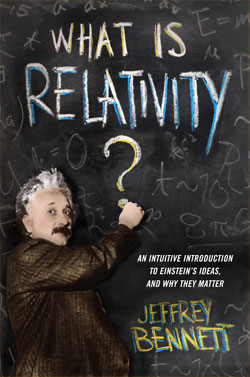 An Intuitive Introduction to Einstein’s Ideas and Why They Matter
An Intuitive Introduction to Einstein’s Ideas and Why They Matter
by Jeffrey Bennett (published by Columbia University Press, 2014)
Learn about Dr. Bennett’s Relativity Tour
Watch Dr. Bennett’s interview on PBS with Barry Kibrick
Watch Dr. Bennett’s talk for the Silicon Valley Astronomy Lectures
Summary
It’s common knowledge that if the Sun suddenly turned into a black hole, Earth and the rest of the planets would be sucked into oblivion. However, this common wisdom is false. As best-selling author and astrophysicist Jeffrey Bennett points out on the very first page of What is Relativity?, the truth is that black holes don’t suck. With that simple idea in hand, Bennett begins this accessible and entertaining introduction to Einstein’s theories by taking readers on an imaginary journey to a black hole, describing the amazing phenomena that they would really experience on their trip.
Of course, black holes are not the only reason that virtually everyone’s heard of the theory of relativity. It’s also the theory that gives us the cosmic speed limit of the speed of light, the mind-bending ideas of time dilation and curvature of spacetime, and what may be the most famous equation in history: E = mc 2. Indeed, the theory of relativity shapes much of our modern understanding of the universe, and it’s not “just a theory”: Every major prediction of relativity has been tested to exquisite precision, and its practical applications include the Global Positioning System (GPS). Yes, that’s right: Your GPS would get you lost if not for relativity.
Despite its fame, very few people know what the theory of relativity is all about, and a common myth holds that the theory is too esoteric or difficult for the average person to understand. What is relativity? will shatter the myth, proving that anyone can understand the basics of Einstein’s ideas. Bennett’s intuitive, non-mathematical approach will give a large audience of readers their first real understanding of how relativity works and why it is so important not only to science and scientists, but to the way all of us view ourselves as human beings. No matter whether you are a poet, a philosopher, or an aspiring physicist, What is Relativity? is sure to give you new insights into Einstein’s ideas and why they matter.
Coming out just a year head of the 100th anniversary of Einstein’s 1915 publication of the general part of his theory, What is Relativity? sets a new standard for making Einstein’s ideas accessible to all. It is especially suited to general readers and middle and high school students.
Buy Direct – Use Code BENN30 for 30% Discount Buy on Amazon
Awards
WINNER – Winner, 2014 Choice Outstanding Academic Title
COMMENDED – 2015 Honorable Mention, Ninth to Twelfth Grade category, Mathical Books
NSTA Recommends List
Reviews
” An impressively accessible distillation of epoch-making science. For in its relatively few pages, Bennett explains relativity to ordinary readers…” — Booklist (Starred Review)
“Jeffrey Bennett’s What is Relativity? is certainly one of the best nonfiction books I’ve read this year: a fast-paced, highly readable account of one of the most important scientific discoveries of all time.” — School Library Journal
“…Bennett’s fun book shows readers what relativity means, and what it reveals about our universe.” — Publishers Weekly
“Understanding the universe requires understanding relativity, and this slim volume does an admirable job without resorting to the gimmicks or magic show common in the Einstein-for-laymen genre. A sober, comprehensible account of what every intelligent layman should know about space and time.” — Kirkus Reviews
“Bennett does a masterly job of teaching a difficult topic without oversimplifying it. The results are recommended for readers at the high school level and above.” — Library Journal
“In What is Relativity?, Jeffrey Bennett seeks to assuage the inhibitions of the reader to understand a topic of which we have all heard, yet one which most of us shy away from as being too complicated for us to understand. Bennett writes in a clear, matter of fact way. He uses examples to which most of us can relate. The book is full of images that aid the reader with the concepts of relativity, and Bennett includes many “thought experiments” to bring the content to a level that most of us can comprehend. … I was very much enlightened by this book and highly recommend it to others.” — NSTA Recommends, reviewed by Allen Henderson
“An entertaining, brilliant introduction to Einstein’s ideas… that is impressively understandable.” — Choice Awards
“Since it first appeared more than a decade ago, I have used the textbook The Cosmic Perspective by Jeffrey Bennett and his colleagues, in no small part because of the excellence of its chapters on relativity. It is wonderful to have a stand-alone volume in which his lucid explanatory text and figures are coupled with a thoughtful commentary on why relativity is important in constructing our scientific, as well as our personal, views of space and time.” — David J. Helfand, President, American Astronomical Society and President & Vice Chancellor, Quest University Canada
“A well written and uniquely readable book that serves beautifully as an introduction to special and general relativity. Bennett carefully avoids bombastic statements and “spectacularization” of the subject, sticking with well-established facts and presenting them in a clear and compelling manner.” — Alberto Nicolis, Columbia University
“I’ve read lots of introductions to relativity, but none is as clear and compelling as this one. For anyone who’s keen to grasp the fundamentally simple, yet non-intuitive, ideas of both special and general relativity, Bennett’s book is the way to go. Impressively understandable and interesting.” — Seth Shostak, Senior Astronomer, SETI Institute
“Probably the best primer on Einsteinian relativity on the market today. Far more lucid than your average physics textbook, Bennett runs through a slew of accessible thought experiments that are easy to commit to memory. While quick to emphasize that each of the ideas discussed has sound mathematical basis, there is almost no math in the book. Its focus is on the conceptual—how relativity works, how it is applied, and what Einstein’s ideas can tell us about the nature of scientific inquiry.” — Daniel Bastian, Waiving Entropy
“What is Relativity? will guide you or your student through the process of the theory, using examples and diagrams that are effective and easy to understand. It’s fun to read. … I am excited to recommend it to parents who are homeschooling their middle school and high school students (or anyone else who just wants the theories of relativity broken down for them).” —Tammy Litke, Three Different Directions blog
Mathical Honor Book, 2015
